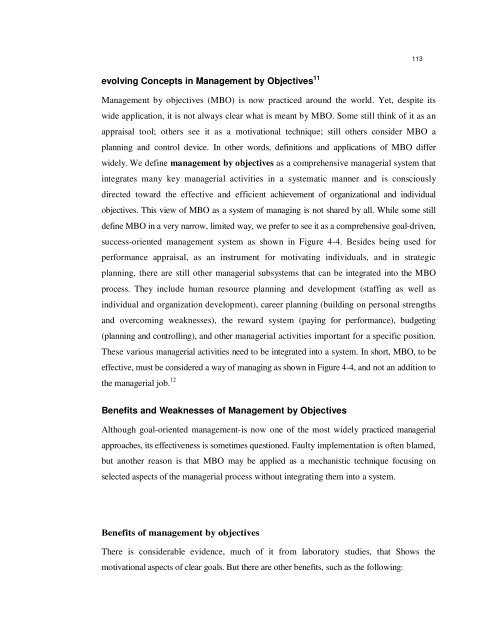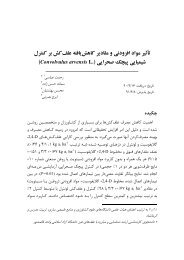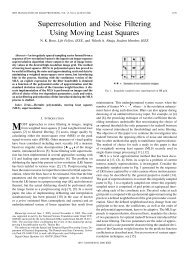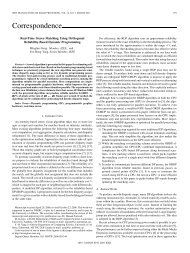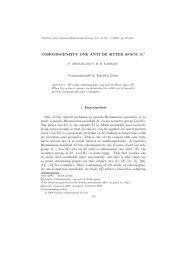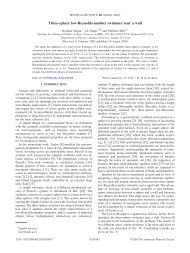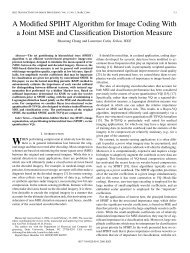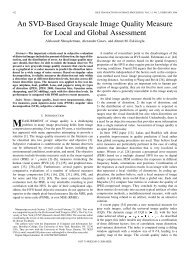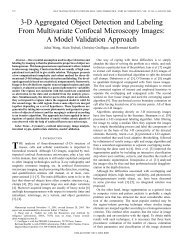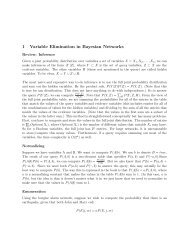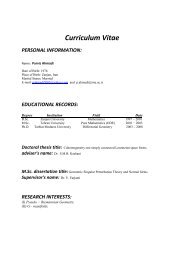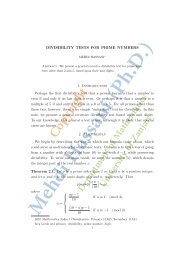Examples <strong>of</strong> nonverifiable <strong>and</strong> verifiable objectivesNonverifiable objective1. To make a reasonable pr<strong>of</strong>it2. To improve communication3. To improve productivity <strong>of</strong>the production department4. To develop better managers5. To install a computer systemVerifiable objective1. To achieve a return on investment <strong>of</strong> 12% at the end <strong>of</strong> the current fiscal year2. To issue a two-page monthly newsletter beginning July 1, 2005, involving notmore than 40 working hours <strong>of</strong> preparation time (after the first issue)3. To increase production output <strong>by</strong> 5% <strong>by</strong> December 31, 2005, withoutadditional costs while maintaining the current quality level4. To design <strong>and</strong> conduct a 40-hour in-house program on the "fundamentals <strong>of</strong>management," to be completed <strong>by</strong> October 1, 2005, involving not more than 200working hours <strong>of</strong> the management development staff <strong>and</strong> with at least 90% <strong>of</strong>the 100 managers passing the exam (specified)5. To install a computerized control system in the production department <strong>by</strong>December 31, 2005, requiring not more than 500 working hours <strong>of</strong> systemsanalysis <strong>and</strong> operating with not more than 10% downtime during the first threemonths or 2% thereaftermaking a reasonable pr<strong>of</strong>it (see Table 4-1) does not state how much pr<strong>of</strong>it isto be made, <strong>and</strong> what is reasonable to the subordinate may not be at allacceptable to the superior. In the case <strong>of</strong> such a disagreement, it is <strong>of</strong>course the subordinate who loses the argument. In contrast, a return oninvestment <strong>of</strong> 12 percent at the end <strong>of</strong> the current fiscal year can bemeasured; it answers these questions: how much or what? when?At times, stating results in verifiable terms is more difficult. This isespecially true when it involves the objectives for staff personnel <strong>and</strong> ingovernment. For example, installing a computer system is an importanttask, but "to install a computer system" is not a verifiable goal. However,suppose the objective is "to install a computerized control system (withcertain specifications) in the production department <strong>by</strong> December 31, 2005,with an expenditure <strong>of</strong> not more than 500 working hours." Then, goalaccomplishment can be measured. Moreover, quality can also be specified interms <strong>of</strong> computer downtime, such as "the system shall be operational 90percent <strong>of</strong> the time during the first two months <strong>of</strong> operation."Guidelines for setting objectivesSetting objectives is indeed a difficult task. It requires intelligent coaching <strong>by</strong>the superior <strong>and</strong> extensive practice <strong>by</strong> the subordinate. The guidelinesshown in Table 4-1 will help managers in setting their objectives.The list <strong>of</strong> objectives should not be too long, yet it should cover themain features <strong>of</strong> the job. As this chapter has emphasized, objectives shouldbe verifiable <strong>and</strong> should state what is to be accomplished <strong>and</strong> when. Ifpossible, the quality desired <strong>and</strong> the projected cost <strong>of</strong> achieving theobjectives should be indicated. Furthermore, objectives should present achallenge, indicate priorities, <strong>and</strong> promote personal <strong>and</strong> pr<strong>of</strong>essionalgrowth <strong>and</strong> development. These <strong>and</strong> other criteria for good objectives arebe summarized in Table 4-1. Testing objectives against the criteriashown in the checklist is a good exercise for managers <strong>and</strong> aspiringmanagers.
113evolving Concepts in Management <strong>by</strong> <strong>Objectives</strong> 11Management <strong>by</strong> objectives (MBO) is now practiced around the world. Yet, despite itswide application, it is not always clear what is meant <strong>by</strong> MBO. Some still think <strong>of</strong> it as anappraisal tool; others see it as a motivational technique; still others consider MBO aplanning <strong>and</strong> control device. In other words, definitions <strong>and</strong> applications <strong>of</strong> MBO differwidely. We define management <strong>by</strong> objectives as a comprehensive managerial system thatintegrates many key managerial activities in a systematic manner <strong>and</strong> is consciouslydirected toward the effective <strong>and</strong> efficient achievement <strong>of</strong> organizational <strong>and</strong> individualobjectives. This view <strong>of</strong> MBO as a system <strong>of</strong> managing is not shared <strong>by</strong> all. While some stilldefine MBO in a very narrow, limited way, we prefer to see it as a comprehensive goal-driven,success-oriented management system as shown in Figure 4-4. Besides being used forperformance appraisal, as an instrument for motivating individuals, <strong>and</strong> in strategicplanning, there are still other managerial subsystems that can be integrated into the MBOprocess. They include human resource planning <strong>and</strong> development (staffing as well asindividual <strong>and</strong> organization development), career planning (building on personal strengths<strong>and</strong> overcoming weaknesses), the reward system (paying for performance), budgeting(planning <strong>and</strong> controlling), <strong>and</strong> other managerial activities important for a specific position.These various managerial activities need to be integrated into a system. In short, MBO, to beeffective, must be considered a way <strong>of</strong> managing as shown in Figure 4-4, <strong>and</strong> not an addition tothe managerial job. 12Benefits <strong>and</strong> Weaknesses <strong>of</strong> Management <strong>by</strong> <strong>Objectives</strong>Although goal-oriented management-is now one <strong>of</strong> the most widely practiced managerialapproaches, its effectiveness is sometimes questioned. Faulty implementation is <strong>of</strong>ten blamed,but another reason is that MBO may be applied as a mechanistic technique focusing onselected aspects <strong>of</strong> the managerial process without integrating them into a system.Benefits <strong>of</strong> management <strong>by</strong> objectivesThere is considerable evidence, much <strong>of</strong> it from laboratory studies, that Shows themotivational aspects <strong>of</strong> clear goals. But there are other benefits, such as the following:


